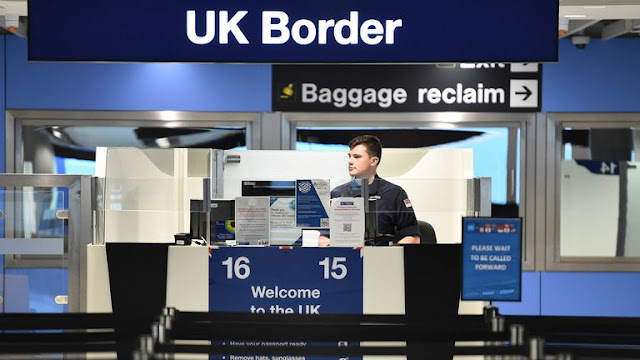In a bold and transformative move, the United Kingdom Government, under the leadership of Prime Minister Sir Keir Starmer, announced on Saturday, August 30, 2025, a significant overhaul of its immigration policies, blocking more than 100 occupations from being filled by foreign workers. This decision, aimed at reducing net migration and prioritizing British workers, marks a pivotal shift in the UK’s visa system and labor market strategy. The Home Office, in a statement posted on X, described the reforms as a critical step toward creating a “fairer, skills-focused system” that opens up opportunities for UK residents while reshaping the country’s approach to immigration.
This policy announcement comes as part of a broader agenda by the Labour Government, which assumed power on July 5, 2024, following a landslide election victory that ousted the Conservative Government led by Rishi Sunak. The move reflects Labour’s commitment to addressing public concerns about immigration levels while tackling domestic unemployment and skills shortages. However, the decision has sparked intense debate, with critics warning that the restrictions could exacerbate labor shortages in key sectors, particularly health and social care, which have long relied on overseas workers to fill critical roles. As the UK navigates this complex policy shift, the implications for its economy, workforce, and global standing are profound and far-reaching.
The Announcement and Its Context
The Home Office’s statement on X was concise but impactful, signaling a major policy shift designed to recalibrate the UK’s labor market. “Cutting net migration means getting the fundamentals right. More than 100 occupations are no longer eligible for overseas recruitment – opening up more jobs for British workers. A fairer, skills-focused system is now taking shape,” the statement declared. While the government has not yet released the complete list of the affected occupations, the announcement has already sent ripples across industries, political circles, and the public.
The decision is the latest in a series of immigration reforms introduced by the Labour Government since taking office. Prime Minister Sir Keir Starmer, who campaigned on a platform of economic renewal and social fairness, has made reducing net migration a cornerstone of his administration’s agenda. The move aligns with Labour’s broader pledge to prioritize domestic workers and address public concerns about the impact of immigration on job opportunities, wages, and public services. By restricting overseas recruitment in over 100 occupations, the government aims to incentivize employers to invest in training and hiring British workers, thereby reducing reliance on foreign labor and fostering a more self-sufficient workforce.
The UK’s immigration system has been a contentious issue for decades, with successive governments grappling with the balance between economic needs and public sentiment. Net migration, which measures the difference between the number of people entering and leaving the UK, has been a particular focus. In recent years, net migration figures have risen significantly, driven in part by post-Brexit changes to immigration rules and global labor demands. The Conservative Government under Rishi Sunak had faced criticism for failing to curb migration levels, despite pledges to do so. Labour’s landslide victory in July 2024 was seen by many as a mandate to deliver on promises of tighter immigration controls while addressing labor market challenges.
The Rationale Behind the Restrictions
The Labour Government’s decision to block overseas recruitment in over 100 occupations is rooted in a multifaceted strategy to address both economic and social priorities. At its core, the policy seeks to reduce net migration, which has been a politically charged issue in the UK. High levels of immigration have often been linked to pressures on housing, public services, and infrastructure, prompting calls for stricter controls. By limiting the number of occupations eligible for overseas recruitment, the government aims to create a labor market that prioritizes British workers, particularly in roles that can be filled by the domestic workforce.
The Home Office’s emphasis on a “skills-focused system” reflects a desire to align immigration policy with long-term economic goals. The government argues that by restricting foreign workers’ access to certain roles, employers will be encouraged to invest in training and upskilling UK residents, addressing skills shortages domestically rather than relying on overseas talent. This approach is seen as a way to boost employment opportunities for British workers, particularly in regions with high unemployment rates, and to reduce wage suppression in lower-skilled sectors, where competition from foreign workers has been a point of contention.
Additionally, the policy is framed as a response to the changing dynamics of the UK labor market post-Brexit. The end of free movement for EU citizens following the UK’s departure from the European Union in 2020 forced a reevaluation of immigration policies. The introduction of the points-based immigration system under the Conservative Government aimed to prioritize high-skilled workers, but critics argued it failed to address labor shortages in sectors such as health, social care, and hospitality. Labour’s reforms build on this framework but take a more restrictive approach, signaling a shift toward self-reliance and domestic workforce development.
The Affected Sectors and Potential Impacts
While the Home Office has yet to publish the full list of the 100+ occupations affected by the new restrictions, early indications suggest that the changes will have a significant impact across multiple sectors. Industries such as health and social care, construction, hospitality, and manufacturing are likely to be among those affected, as they have historically relied heavily on overseas workers to fill critical roles. The absence of a detailed list has fueled speculation and concern, with employers and industry leaders seeking clarity on how the restrictions will affect their operations.
The health and social care sector, in particular, is a focal point of concern. The National Health Service (NHS) and private care providers have long depended on international recruitment to address staffing shortages, with thousands of nurses, doctors, and care workers from countries such as India, the Philippines, and Nigeria filling vital roles. The UK’s aging population and increasing demand for healthcare services have exacerbated these shortages, making overseas workers a lifeline for the sector. Critics of the new restrictions warn that limiting foreign recruitment could deepen staffing crises, leading to longer waiting times for patients, reduced care quality, and increased pressure on existing staff.
In social care, the impact could be even more pronounced. The sector has struggled with chronic underfunding and low wages, making it difficult to attract and retain British workers. Overseas workers have been instrumental in filling care home and home care roles, particularly in the wake of Brexit, which reduced the supply of EU workers. By blocking these roles from overseas recruitment, the government risks creating significant gaps in the workforce, potentially compromising care for vulnerable populations such as the elderly and disabled.
Other sectors likely to be affected include construction, where shortages of skilled workers such as bricklayers and carpenters have been well-documented, and hospitality, which has faced challenges in recruiting staff for roles such as chefs and waiting staff. Manufacturing and logistics, too, may feel the pinch, as these industries often rely on overseas workers to fill lower-skilled but essential positions. The restrictions could force employers to raise wages or invest in automation to offset labor shortages, but such measures may not be feasible for all businesses, particularly small and medium-sized enterprises (SMEs).
Criticisms and Concerns
The announcement has sparked a polarized response, with critics warning that the restrictions could have unintended consequences for the UK economy. Industry leaders, particularly in health and social care, have expressed alarm at the potential for deepened labor shortages. The NHS Confederation, which represents healthcare organizations, has called for urgent clarification on the affected occupations, warning that any reduction in overseas recruitment could “severely impact” patient care. Similarly, the National Care Association has highlighted the reliance of the social care sector on international workers, urging the government to consider exemptions for critical roles.
Economists and business groups have also raised concerns about the broader economic implications. The Confederation of British Industry (CBI) has warned that restricting access to overseas workers could hamper economic growth, particularly in sectors already grappling with labor shortages. The UK’s post-Brexit labor market has struggled to adapt to the loss of EU workers, and further restrictions could exacerbate these challenges, potentially leading to higher costs for businesses and consumers.
Critics also argue that the policy risks undermining the UK’s reputation as an open and attractive destination for global talent. The restrictions could deter highly skilled workers from seeking opportunities in the UK, particularly in industries such as technology and finance, where international expertise is highly valued. This could have long-term implications for the UK’s competitiveness in a globalized economy, particularly as other countries compete to attract top talent.
On the other hand, supporters of the policy argue that it is a necessary step to address public concerns about immigration and to create a more equitable labor market. They contend that prioritizing British workers will encourage employers to invest in training and development, ultimately leading to a more skilled and resilient workforce. The government’s emphasis on a “skills-focused system” is seen as a way to align immigration policy with the needs of the modern economy, ensuring that only those with in-demand skills are granted work visas.
The Political Landscape
The restrictions are a significant milestone in Sir Keir Starmer’s premiership, which has been defined by a focus on pragmatic governance and economic reform. Since taking office, the Labour Government has sought to distance itself from the policies of the previous Conservative administration, which faced criticism for its handling of immigration. Rishi Sunak’s government had pledged to reduce net migration but struggled to balance economic demands with political pressures, leading to accusations of inconsistency. Labour’s decisive action on overseas recruitment signals a more assertive approach, aimed at delivering on election promises while addressing voter concerns.
The timing of the announcement is notable, coming just weeks after Labour’s landslide victory on July 5, 2024. The election result, which saw Labour secure a commanding majority in Parliament, was interpreted as a mandate for change, with immigration policy a key issue for many voters. By introducing these restrictions, Starmer is seeking to demonstrate that his government is responsive to public sentiment while laying the groundwork for long-term economic reform.
However, the policy is not without political risks. The Labour Government must navigate a delicate balance between addressing immigration concerns and maintaining the support of business leaders and progressive voters, who may view the restrictions as overly restrictive. The absence of a published list of affected occupations has added to the uncertainty, with opposition parties and advocacy groups calling for greater transparency. The Conservative Party, now in opposition, has accused Labour of rushing the policy without adequate consultation, while the Liberal Democrats have warned of the potential harm to public services.
The Path Forward
As the UK implements these new restrictions, several key questions remain unanswered. The most pressing is the full list of affected occupations, which will determine the scope and impact of the policy. The Home Office has indicated that the list will be published in due course, but the delay has fueled speculation and concern among employers and workers alike. Clarity on the criteria used to select the 100+ occupations will also be crucial, as it will shed light on the government’s priorities and the sectors most likely to be affected.
Another critical issue is how the government plans to address the potential labor shortages resulting from the restrictions. Ministers have emphasized the importance of investing in domestic training and upskilling programs, but such initiatives will take time to yield results. In the interim, sectors such as health and social care may face significant challenges, particularly if exemptions or transitional arrangements are not put in place. The government has hinted at the possibility of targeted exemptions for critical roles, but no firm commitments have been made.
The broader implications for net migration are also uncertain. While the restrictions are expected to reduce the number of overseas workers entering the UK, their impact on overall migration levels will depend on other factors, such as student visas, family reunification policies, and asylum applications. The Labour Government has pledged to take a holistic approach to immigration, with further reforms expected in the coming months. These could include changes to the points-based system, visa quotas, and policies for high-skilled workers.
Economic and Social Implications
The restrictions on overseas recruitment are likely to have far-reaching economic and social consequences. In the short term, businesses in affected sectors may face higher costs as they compete for a smaller pool of domestic workers. This could lead to wage increases in some industries, which could benefit British workers but also contribute to inflationary pressures. Small businesses, in particular, may struggle to adapt, as they often lack the resources to invest in training or automation.
Socially, the policy could reshape public perceptions of immigration and the labor market. By prioritizing British workers, the government aims to address concerns about job competition and wage suppression, particularly among lower-skilled workers. However, the restrictions could also exacerbate divisions, with some communities feeling that the policy unfairly targets migrant workers who have contributed significantly to the UK economy.
The health and social care sector, in particular, is a microcosm of these challenges. Overseas workers have been integral to the NHS and care homes, often taking on roles that British workers are reluctant to fill due to low pay and demanding conditions. The restrictions could lead to a staffing crisis in these sectors, with potential consequences for patient care and public health. Addressing these challenges will require a coordinated approach, including increased funding for training programs, better wages for care workers, and targeted recruitment campaigns to attract British workers to these roles.
Global Comparisons and Lessons
The UK’s move to restrict overseas recruitment is not unique, as other countries have implemented similar policies in response to domestic labor market challenges. For example, Australia and Canada have introduced measures to prioritize local workers in certain sectors, while also maintaining pathways for high-skilled migration. These countries offer potential lessons for the UK, particularly in balancing economic needs with public sentiment. Successful implementation will require careful planning, stakeholder engagement, and a commitment to addressing labor shortages through domestic training and investment.
The UK could also look to its own history for guidance. Previous attempts to reduce reliance on overseas workers, such as the post-Brexit immigration changes, have met with mixed success. While the points-based system succeeded in attracting high-skilled workers in some sectors, it also led to labor shortages in others, particularly agriculture and hospitality. The Labour Government will need to avoid repeating these mistakes by ensuring that the new restrictions are accompanied by robust support for affected industries.
Conclusion
The UK Government’s decision to block over 100 occupations from overseas recruitment marks a significant turning point in its immigration and labor market policies. Announced on August 30, 2025, the move reflects the Labour Government’s commitment to reducing net migration, prioritizing British workers, and creating a “fairer, skills-focused system.” Under Prime Minister Sir Keir Starmer, the policy is a bold attempt to address public concerns about immigration while fostering a more self-sufficient workforce.
However, the restrictions come with significant risks, particularly for sectors such as health and social care, which rely heavily on overseas workers. Critics warn that the policy could deepen labor shortages, increase costs for businesses, and undermine the UK’s reputation as a destination for global talent. The absence of a published list of affected occupations has added to the uncertainty, leaving employers and workers anxiously awaiting further details.
As the UK navigates this complex policy shift, the government will need to balance its immigration goals with the needs of the economy and public services. Investments in training, upskilling, and targeted exemptions for critical roles will be essential to mitigate the impact of the restrictions. The coming months will be critical in determining whether the Labour Government can deliver on its promise of a fairer and more sustainable labor market, or whether the policy will exacerbate existing challenges in an already strained economy. For now, the announcement has set the stage for a transformative period in the UK’s immigration and workforce landscape, with far-reaching implications for its future.






